定语从句、名词性从句和状语从句
英语各种从句的区别

在句子里做主语,宾语,表语的分别是主语,宾语,表语从句。
修饰名词的是定语从句,相当于形容词。
修饰整个句子,动词,形容词的是状语从句。
在英语中,主要有三大从句,即名词性从句(包括主语从句,宾语从句,表语从句,同位语从句)、形容词性从句(即定语从句)、副词性从句(即状语从句,包括时间、条件、结果、目的、原因、让步、地点、方式等)。
1,定语从句。
1)先行词是名词。
2)定语从句跟在名词后。
是修饰名词的。
3)与中文顺序相反。
4)定语从句的组成是:连词+主+谓+宾。
5)连词在从句里可以作主语、宾语、状语等。
6)当先行词的名词表示人时,后面的连词用who+v/(whom)+s+v/whose+N+s+v. 当先行词的名词表示物时,后面的连词用which/that ,whose.7)连词前可以有介词。
8)不许用what1. All the people who work on a newspaper must be able to work fast.2. Corn is a useful plant which can be eaten by both people and animals.3. I have a friend whose cousin is a tennis player.4. The boy lived in a part of town where there were no schools.5. During the hurricane, one of the tree branches broke the bed in whichthe girl had been sleeping.II. 名词从句。
起名词作用。
=名词1. 主语从句。
1)在主语位置上。
2)组成:连词+主语+谓语+宾语3)连词不可省4)不许用ifWhen we’ll go to school is still a question.2. 宾语从句。
理解4种词性,轻松驾驭3大从句:名词性从句、定语从句、状语从句
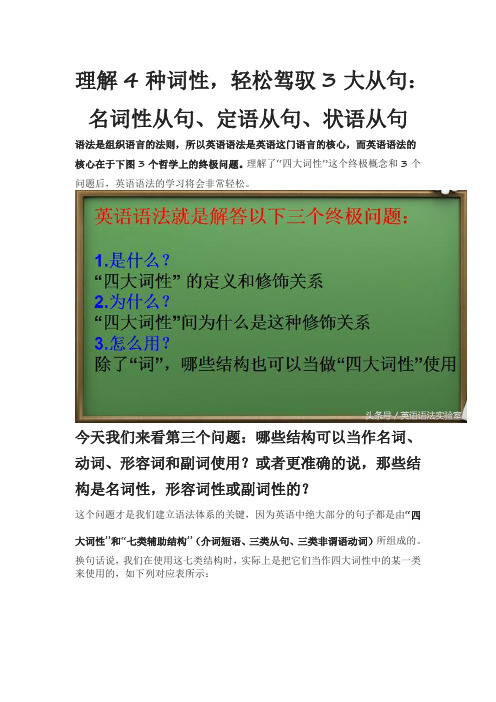
理解4种词性,轻松驾驭3大从句:名词性从句、定语从句、状语从句语法是组织语言的法则,所以英语语法是英语这门语言的核心,而英语语法的核心在于下图3个哲学上的终极问题。
理解了“四大词性”这个终极概念和3个问题后,英语语法的学习将会非常轻松。
今天我们来看第三个问题:哪些结构可以当作名词、动词、形容词和副词使用?或者更准确的说,那些结构是名词性,形容词性或副词性的?这个问题才是我们建立语法体系的关键,因为英语中绝大部分的句子都是由“四大词性”和“七类辅助结构”(介词短语、三类从句、三类非谓语动词)所组成的。
换句话说,我们在使用这七类结构时,实际上是把它们当作四大词性中的某一类来使用的,如下列对应表所示:注:只有谓语动词才具有动词词性,其他任何结构包括非谓语动词都无法替代。
所以不再列出。
从上表可以看出,从句分为名词从句、定语从句、状语从句三个大类,正好分别对应了名词、形容词、副词这三大词性。
所以,我们也可以这样理解这三类从句:1.名词性从句:可以当作名词使用的从句。
顾名思义,就是把一个完整的句子当做名词来用,在另一个句子(主句)中充当成分,而名词常做四种成分:主语,宾语,表语,同位语。
所以便有了四种名词性从句:主语从句,宾语从句,表语从句和同位语从句。
例句回顾:①That English is important is known to all.(主语从句)注:避免头重脚轻It is known to all that English is important. (It作形式主语)② We all know that English is important.(宾语从句)③ What we all know is that English is important.(表语从句)④ What is known to all is the fact that English is important.(同位语从句)2.定语从句:可以当作形容词使用的从句。
语法讲座之九名词性从句和定语从句和状语从句
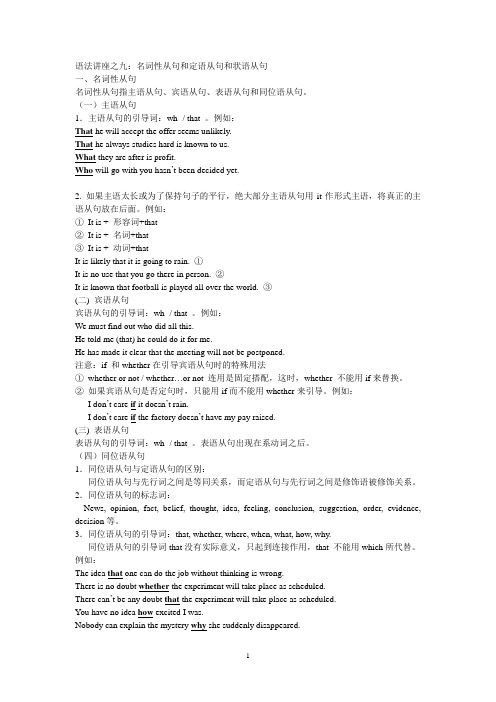
语法讲座之九:名词性从句和定语从句和状语从句一、名词性从句名词性从句指主语从句、宾语从句、表语从句和同位语从句。
(一)主语从句1.主语从句的引导词:wh- / that 。
例如:That he will accept the offer seems unlikely.That he always studies hard is known to us.What they are after is profit.Who will go with you hasn’t been decided yet.2. 如果主语太长或为了保持句子的平行,绝大部分主语从句用it作形式主语,将真正的主语从句放在后面。
例如:①It is + 形容词+that②It is + 名词+that③It is + 动词+thatIt is likely that it is going to rain. ①It is no use that you go there in person. ②It is known that football is played all over the world. ③(二) 宾语从句宾语从句的引导词:wh- / that 。
例如:We must find out who did all this.He told me (that) he could do it for me.He has made it clear that the meeting will not be postponed.注意:if 和whether在引导宾语从句时的特殊用法①whether or not / whether…or not 连用是固定搭配,这时,whether 不能用if来替换。
②如果宾语从句是否定句时,只能用if而不能用whether来引导。
例如:I don’t care if it doesn’t rain.I don’t care if the factory doesn’t have my pay raised.(三) 表语从句表语从句的引导词:wh- / that 。
三大从句
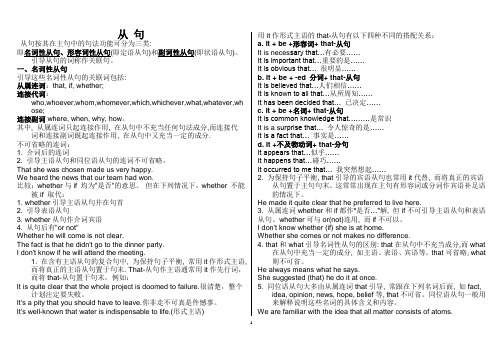
从句从句按其在主句中的句法功能可分为三类:即名词性从句、形容词性从句(即定语从句)和副词性从句(即状语从句)。
引导从句的词称作关联句。
一、名词性从句引导这些名词性从句的关联词包括:从属连词:that, if, whether;连接代词:who,whoever,whom,whomever,which,whichever,what,whatever,wh ose;连接副词where, when, why, how。
其中, 从属连词只起连接作用, 在从句中不充当任何句法成分,而连接代词和连接副词既起连接作用, 在从句中又充当一定的成分.不可省略的连词:1. 介词后的连词2. 引导主语从句和同位语从句的连词不可省略。
That she was chosen made us very happy.We heard the news that our team had won.比较:whether与if 均为"是否"的意思。
但在下列情况下,whether 不能被if 取代:1. whether引导主语从句并在句首2. 引导表语从句3. whether从句作介词宾语4. 从句后有"or not"Whether he will come is not clear.The fact is that he didn't go to the dinner party.I don't know if he will attend the meeting.1. 在含有主语从句的复合句中, 为保持句子平衡, 常用it作形式主语,而将真正的主语从句置于句末. That-从句作主语通常用it作先行词,而将that-从句置于句末,例如:It is quite clear that the whole project is doomed to failure.很清楚,整个计划注定要失败。
英语三大从句语法讲解

英语三大从句在英语中,主要有三大从句,即名词性从句包括主语从句,宾语从句,表语从句,同位语从句、形容词性从句即定语从句、副词性从句即状语从句,包括时间、条件、结果、目的、原因、让步、地点、方式等;定语从句一、关系代词引导的定语从句关系代词代替前面的先行词,并且在定语从句中充当句子成分,可以作主语、宾语、定语等;常见的关系代词有:who, that, which;它们的主格、宾格和所有格如下表所示:一关系代词who, whom和 whose的用法who代替人,是主格,在定语从句中作主语;An architect is a person who designs buildings. 建筑师是设计房屋的人;whom代替人,是宾格,在定语从句作宾语,在非正式英语常可省略;Do you know the gentleman whom we met in the school library yesterday 昨天我们在学校图书馆里遇到的那位先生你认识吗whose一般代替人,有时亦可代替物,是所有格,在定语从句作定语;The girl student whose father is a senior engineer used to study abroad. 其父是一位高级工程师的那个女学生过去在国外留学;Do you know the name of the hotel whose window we can see here 我们这儿能看到窗户的那个宾馆叫什么名字,你知道吗关系代词whose指代先行词hotel,正式用法应该用of which;whose window=the window of which,意思是:the window of the hotel;二关系代词which的用法which代替物,在定语从句作主语或宾语,作宾语时还可省略;I do not like stories which have unhappy endings.我不喜欢有不幸结局的小说;which可以换成that三关系代词that的用法that既可指人又可指物,在当代英语中大多指物,在定语从句作主语或宾语,作宾语时还可省略;: Is she the girl that sells newspapers她是卖报纸的那个女孩吗that可以换成whoWhere is the ice-cream that was in the fridge放在冰箱的冰激凌哪儿去了that可以换成whichIs this the book that you want to buy这是你要买的那本书吗 that可以换成which,在定语从句作宾语,还可以省略二、关系副词引导的定语从句常用的关系副词只有三个:when, where, why,在定语从句中充当时间、地点和原因状语;一关系副词when的用法关系副词when代替的先行词表示的是时间,when在定语从句作时间状语;In Beijing July and August are the months when it rains very often.北京的七月和八月是常下雨的月份;when先行词是months二关系副词where的用法关系副词where代替的先行词表示的是地点,where在定语从句作地点状语;During the Spring Festival I went back to the town where I was brought up.春节期间,我回到了生我养我的家乡;where的先行词是town三关系副词why的用法关系副词why代替的先行词表示的是原因,why在定语从句作原因状语;The reason why I am phoning you is to ask you whether you have got my email.我打电话给你的原因是想问问你是否收到了我的电子邮件;why先行词是reason, 当代英语里why可以用that替代,这时关系代词that就变成了表示原因的关系副词,还可以将why省略三、特殊关系代词as引导的定语从句一在固定搭配as…as, so…as, such…as, the same…as中,as引导定语从句You may take as many books as you want.你想要拿多少书就拿多少;第一个as是副词,修饰many的;第二个as才是关系代词,代替先行词books,在定语从句中作宾语二独立于主句之外,as引导定语从句As we know/ As is known to us, the earth turns around the sun. 正如我们所知,地球围绕太阳旋转;As we know和 As is known to us均为定语从句,as分别作宾语和主语,替代后面的主句;Taiwan is, as you know, an inseparable part of China.你知道,台湾是中国不可分割的一部分;关系代词as指代整个主句,在定语从句中作宾语;四、关系代词who, which与that的区别一关系代词who与that的区别1. 当关系代词用作主语时,多用主格who;He who loses hope loses all.失去希望的人就失去一切;先行词为代词he, they, any, all, one等时,多用whoI met Alice, who told me that she was learning Chinese.我遇见艾丽斯,她告诉我她在学汉语;在非限制性定语从句中,用who2. 当关系代词用作介词后的宾语时,用宾格whom,不用that;The man to whom our headmaster talked just now is our English teacher.我们校长刚才与他谈话的那个人是我们的英语老师;介词与关系代词紧密相连时,只能用宾格whom,不可用主格who注意:介词与关系代词不是紧密相连时,或者说介词放在句子后面时,这时可以用主格who,也可用that,还可以省略关系代词;因此,上面的这句话还可以有如下四种说法:1 The man whom our headmaster talked to just now is our English teacher.2 The man who our headmaster talked to just now is our English teacher.3 The man that our headmaster talked to just now is our English teacher.4 The man our headmaster talked to just now is our English teacher.3. 当关系代词泛指人时,多用that;He is a man that is never afraid of failure.他是个从不怕失败的人;that用来泛指人4. 当关系代词出现在who开头的疑问句时,应用that;例如:Who is the girl that is talking to Tom in English用英语同汤姆交谈的那个女孩是谁避免重复使用who,以免造成误解或语义含混不清二关系代词which与that的区别1. 当先行词为all, much, little以及不定代词anything, something, everything等时,关系代词多用that;All that glitters is not gold. 闪闪发光物,未必尽黄金;She told me everything that she knew. 她把她所知道的一切都告诉了我;2. 当先行词的前面有形容词最高级、序数词或限定词the only, the very, all, every, any, no 等时,关系代词一般都用that;This is the best novel that I have ever read. 这是我读过的最好的一部小说;He is the only person that has been invited to the ball. 他是惟一应邀参加舞会的人;3. 当关系代词出现在which开头的疑问句时,应用that;Which was the hotel that was recommended to the foreign guest 哪一个是推荐给外宾的宾馆这里使用that很明显是为了避免重复which4. 在非限制性定语从句中,关系代词一般只用which;Beijing, which is the capital of the People’s Republic of China, will host the 2008 Olympic Games. 北京是中华人民共和国的首都,将主办2008年奥运会;5. 介词后的关系代词用which,而不用that;She has collected 600 stamps, 60% of which are German stamps. 她收集了600张邮票,其中60%是德国邮票;五、定语从句的位置如前所述,定语从句一般总是直接置于所修饰的名词或代词之后;有时候,定语从句与先行词之间插入了其他的短语,这样它们被分隔了,这种情况下的定语从句被称作隔离定语从句;There was a girl upstairs who was shouting and crying, obviously mad.楼上有一个女孩,大喊大叫;很明显,她疯了;定语从句who was shouting and crying修饰the girl,被upstairs所隔开A new master will come tomorrow who will teach you German.明天要来一位新老师教你们德语了;定语从句置于句末以示强调名词性从句宾语从句一、引导词1由that 引导的陈述句性的宾语从句,在很多动词如say, think, wish , hope, see, believe, agree, expect, hear , feel等动词后;连词that只起连接作用,在从句中不做句子的成分,也无词汇意义,在口语中常被省略;如:I told him that he was wrong.在think, believe, suppose, expect等动词引起的宾语从句中,有时谓语尽管是否定意义,却不用否定形式,而将think 等动词变为否定形式;见语法:否定转移如:I don’t think you are right. 我认为你做的不对在许多带有复合宾语的句子中,that引导的宾语从句经常移到句子的后面,而用it做形式宾语;We think it wrong that he told a lie to everyone 我认为他向每一个人撒谎是错误的2 由连词if、 whether 引导的表示“是否…”的宾语从句;Whether, if 在从句中不做句子的成分,一般情况下,whether和if 可以替换;I don’t know if/whether he will come tomorrow.在介词后面的宾语从句中不用if引导Everything depends on whether we have enough money.宾语从句中有or not时不用if引导.I don’t know whether the movie star will come or not.和不定式连用作宾语时不用if引导Whether to go there or not hasn’t been decided.3由wh-引导的宾语从句;连接代词who, whom, whose, what, which和连接副词when, where, why, how 等连接的宾语从句,它们在句中即有连接从句的作用,又在句中充当句子的成分;Do you know which film they are talking about which做定语I don’t know where he lives. where 做地点状语二、宾语从句的语序,宾语从句的语序必须是陈述语序,既连接词+主语+谓语+其他成分 I believe that they will come soon.特例:有下列常见的问句,作为从句出现,是“不改变语句顺序”的;1. What's the matter2. What's wrong3. What's up4. What's the problem5. What's your trouble三、宾语从句的时态;宾语从句的时态受主句的限制,即:主句是一般现在时态,从句根据实际情况而定;主句是一般过去时态,从句用相应的过去的时态;如果从句的动作发生在主句之前,则从句要用过去完成时态;1 She says that she is a student.→ She said that she was a student.2She says that she will fly to Japan in a week. → She said that she would fly to Japan in a week.3She says that she has finished her homework alre ady. → She said that she had finished her homework already.1如果宾语从句说的是客观真理、自然现象或事实时,这时宾语从句要用一般现在时态;The teacher said that the earth goes round the sun.2Could you tell me…是用来征询对方的意见,语气委婉,并不表示过去;Could you tell me when we will visit the History Museum注意事项:3由陈述句变成宾语从句时,要注意人称的变化;She said: “I have been to England before.” → She said that she had been to England before. She asked me: “Do you like maths” → She asked me if I liked maths.4宾语从句与简单句的交换;由连接代词和连接副词引导的宾语从句,如果宾语从句的主语和主句的主语是同一个人时,可以用“疑问词+不定式”做宾语的简单句结构;I don’t know what I should do next. → I don’t know what to do next.DO SOME EXERCISES:you see AA. what he’s readingB. what is he readingC. what does he readD. he reads what2. Does Jack come from Japan Do you know合并成一个句子Do you know ___that__Jack __come___from Japandid your son say in the letter_He told me that he_D__ the Disney the next day.A. will visitB. has visitedC. is going to visitD. would visit4. He didn’t know___A____A. what’s the matterB. what the matter isC. what was the matterD. what the matter was5. Somebody called you just now, but I didn’t know__D__A. who were theyB. who they wereC. who was itD. who it was6. I want to know___D__A. what is his nameB. what’s his nameC. that his name isD. what his name is7. ---Could you tell me __C__she is looking for---Her cousin, Susan.A. thatB. whose C .who D. which8. ---What are you searching the Internet for---I’m trying to find out____.A. What is the difference between SARS and BIRDFLUB. How many persons have died in IraqC. How to protect our environmentD. Why is our Chinese team be able to beat Korea同位语从句一一般来说,在主从复合句中,用作同位语的从句叫同位语从句;它通常跟在某些名词之后,用以说明或解释该名词表示的具体内容;可以跟同位语从句的名词通常有:advice, decision, fact, hope, idea, information, message, news, promise, proposal, reply, report, suggestion, word消息,problem, question, doubt, thought等;eg: They were delighted at the news that their team had won.当听到他们队获胜的消息时,他们欣喜若狂;有时同位语从句可以不紧跟在被说明的名词后面,而被别的词隔开; 如:The thought came to him that Tom might have returned the book.他突然想起汤姆可能已经还了书了;二引导词1. The news that Mr. Li will be our new English teacher is true.2. He hasn’t made the decision whether he will go there.3. The question who should do the work is being discussed at the meeting.4. I have no idea what the boy is doing in the next room now.5. We haven’t yet settled the question where we are going to spend our summer vacation this year.6. I have no idea how I can get to the railway station.7. I have no idea when he will be back.小结:① that引导同位语从句时无词义,也不充当任何成分,但通常不可以省略,如句1;② whether引导同位语从句时意为“是否”,通常不能用if来代替, 如句2;③ 连接代词who, what等可以引导同位语从句,如句3, 4;④ 连接副词where, how, when等可以引导同位语从句, 如句5,6,7;三 that 引导的同位语从句和定语从句① 意义不同:同位语从句用来进一步说明前面名词的内容;而定语从句用来修饰、限定前面的先行词;试比较:1. The news that our team has won the final match is encouraging.2. The news that you told us is really encouraging.② that的功能不同:that引导同位语从句时是一个纯连词,不充当任何成分;而引导定语从句时,不仅起连接作用,而且还指代先行词并在从句中充当主语、宾语等成分;试比较:1. Dad made a promise that he would buy me a CD player if I passed the English test.2. Dad made a promise that excited all his children.③ 可否省略:that在引导同位语从句时,通常不可省略;在引导定语从句时,若在从句中作宾语,通常可以省略,若作主语则不可以省略;DO SOME EXERCISES:I. 请用适当的词填空,使下列句子意思完整;1. They expressed the hope _that_ they would come over to China soon.2. The fact ___that____ he didn’t see Tom this morning is true.3. Word has come __where_____ some American guests will come to our college for a visitnext week.4. He can’t answer the question ___how____ he got the money from his home yesterday.5. Do you have any idea __what___ is actually going on in the classroom6. The problem _______ we should have the meeting in the hall now must be decided at once. II. 下列各句中均有一处错误,请改正;1. Our team has won the game, that made us very happy.2. I’ve come with a message from Mr Wang how he won’t be able to see you this afternoon.3. He must answer the question if he agrees with what she said or not.4. I’ve read the book where you gave me the day before yester day.5. One of the men heldthe opinion when what the book said was right.表语从句表语从句只能置于主句之后,而主句的动词只能是连系动词;名词性从句在be等系动词后作表语时被称为表语从句The problem is how we can get the things we need.问题是我们怎样能弄到我们需要的东西;how 在表语从句中充当方式状语The scissors are not what I need. 这把剪刀不是我所需要的;what 在表语从句中充当宾语What I told him was that I would find him a good play. 我告诉他的是我会给他找个好剧本;what 在主语从句中作直接宾语, that作为表语从句的引导词在该表语从句中不充当句子成分, 不能省略That is what I want to tell you.那就是我想要对你讲的;what在表语从句中充当直接宾语That is why she failed to pass the exam. 那就是她考试不及格的原因;why 在表语从句中充当原因状语“That is why...”是常用句型, 意为“这就是……的原因/因此……”, 其中why引导的名词性从句在句中作表语, 该句型通常用于针对前面已经说明过的原因进行总结下面是两个与“That is why...”形式相似的结构, 它们与“That is why...”结构之间的关系要能够辨析清楚:1“That is why...”与“That is the reason why...”同义, 只不过从语法结构上讲, “That is the reason why...”中why引导的是—个定语从句, 将其中的the reason去掉则与“That is why...”结构一样 That is the reason why I cannot agree.2“That is because...”句型中从属连词because引导的名词性从句在此作表语, 这也是个常用句型, 意为“这就是为什么……/因为……”;“That is because...”与“That is why...”之间的不同在于“That is because...”指原因或理由, “That is why...”则指由于各种原因所造成的后果He did not see the film last night. That is because he had to help his little sister with her homework.昨天晚上他没有去看电影, 那是因为他得帮助他的妹妹做作业;第一句话说明结果, 第二句话说明原因He had seen the film before. That is why he did not see it last night.他以前曾看过那部电影, 因此他昨天晚上没有去看;第一句话说明原因, 第二句话说明结果考题1The traditional view is ____ we sleep because our brain is “programmed” to make us do so. 2007上海A. whenB. whyC. whetherD. that考题2You are saying that everyone should be equal, and this is ____ I disagree. 2004A. whyB. whereC. whatD. how考题3— I drove to Zhuhai for the air show last week.— Is that ____ you had a few days off 1999A. whyB. whenC. whatD. where考题4____ made the school proud was ____ more than 90% of the students had been admitted to key universities. 2003上海春A. What; becauseB. What; thatC. That; whatD. That; because考题5—Are you still thinking about yesterday’s game—Oh, that’s ____. 2003北京春A. what makes me feel excitedB. whatever I feel excited aboutC. how I feel about itD. when I feel excited表语从句与宾语从句的关系宾语从句和表语从句都属于名词性从句;其作用跟名词在句中的作用相同;故充当宾语的句子叫宾语从句,充当表语的句子叫表语从句;宾语从句1对于宾语从句要掌握以下三点①语序: 从句的语序必须是陈述句语序, 即“主语 + 谓语”这种形式;②时态: 当主句是一般现在时或一般将来时的时候, 从句可以是任何时态, 而当主句是一般过去时的时候, 从句时态必须是过去时范围的时态, 即一般过去时, 过去进行时, 过去完成时, 过去将来时;③连接词: 当从句意思完整, 主句意思肯定时, 连接词用that, 且可以省去当从句意思完整, 主句意思不确定或含否定含意时, 常用if或whether是否当从句意思不完整时, 连接词则是代替不完整部分的特殊疑问词;表语从句在句子中起表语作用的从句叫做表语从句,位于主句系动词的后面;表语从句的引导词和主语从句的引导词相同;也是名词性从句的一种;What the police want to know is when you entered the room.警察想知道的是你什么时候进的房间;The trouble is that we are short of funds困难是我们缺乏资金;This is what we should do这是我们应当做的;That is why I want you to work there那就是我要你在那儿工作的原因;His first question was whether Mr. Smith had arrived yet他的第一个问题是史密斯先生到了没有; 从句中的疑问句用正常语序,即陈述语序;as if, as though, because也可用来引导表语从句;She seems as if she had done a great thing她看起来好像做了一件大事;It is because you eat too much那是因为你吃得太多了;状语从句一状语从句的种类1.时间状语从句2.地点状语从句;3.原因状语从句;4.条件状语从句;5.目的状语从句;6.让步状语从句;7比较状语从句;8.程度状语从句;9.方式状语从句;10.结果状语从句;二状语从句的时态一般情况下,时间和条件状语从句的谓语动词一般用“一般现在时”表示“一般将来时”,用“现在完成时”表示“将来完成时”;1时间状语从句1.由when, while, as引导的时间状语从句;when, while和as的区别:when引导的从句的谓语动词可以是延续性的动词,又可以是瞬时动词;并且when有时表示“就在那时”;While引导的从句的谓语动作必须是延续性的,并强调主句和从句的动作同时发生或者相对应;并且while有时还可以表示对比;While my wife was reading the newspaper, I was watching TV.As表示“一边……一边”,as引导的动作是延续性的动作,一般用于主句和从句动作同时发生;as也可以强调“一先一后;As we was going out, it began to snow.当我们出门时,开始下雪了;as强调句中两个动作紧接着先后发生,而不强调开始下雪的特定时间2.由before和after引导的时间状语从句;before引导的从句不再用否定式的谓语,并且当before引导的从句位于主句之后,有时译成“就,才”; 时态:当主句用将来时,从句总是用现在时;如果before引导的从句谓语用的是过去时,则主句动词多用过去完成时,这样以便体现动作发生的先后;After表示主句动作发生在从句动作之后;主句和从句的动作的时间关系正好与before引导的从句相反;3.由till或until引导的时间状语从句;till和until一般情况下两者可以互换,但是在强调句型中多用until;并且要注意的是:如果主句中的谓语动词是瞬时动词时,必须用否定形式;如果主句中的谓语动词是延续性动词时,用肯定或否定形式都可以,但表达的意思不同;4.由since引导的时间状语从句;since引导的从句的谓语动词可以是延续性的动词,又可以是瞬时动词;一般情况下,从句谓语动词用一般过去时,而主句的谓语动词用现在完成时;但在It is +时间+since从句的句型中,主句多用一般现在时;5.由as soon as, immediately, directly, instantly, the moment, the instant, the minute, 等引导的时间状语从句;这些连词都表示“一……就”;hardlyscarcely, rarely…when / before, no sooner…than相当于as soon as之意;主句用过去完成时,从句用一般过去时;当hardly, scarcely, rarely和no sooner位于句首时,主句应用倒装语序;6.由by the time引导的时间状语从句;时态的变化:在一般情况下,如果从句的谓语动词用一般过去时,主句的谓语动词用过去完成时;如果从句的谓语动词用一般现在时,主句的谓语动词用将来完成时;7.由each time, every time和whenever引导的时间状语从句;8.由as long as和so long as引导的时间状语从句;这两个连词表示“只要;和…一样长”;2地点状语从句地点状语从句一般由连接副词where, wherever等引导,已经形成了固定的句型,:句型1:Where+地点从句,there+主句;此句型通常译成“哪里……哪里就……”;主句在从句后面时,there可用可不用;如果主句在从句的前面时,一般都不用there;句型2:Anywhere/ wherever+地点从句,+主句;状语从句是句子的状语由一个从句充当,来修饰主句中的动词,形容词或副词等;状语从句都由从属连词引导,与主句连接,放在句末时,一般不在前面加逗号;3原因状语从句: because, since, as和for都表示原因;because语势最强,回答why提出的问题,用来说明人所不知的原因;当能够很明显的看出原因或人们已知原因,就用as或since;由because引导的从句如果放在句末,且前面有逗号,则可以用for来代替;但如果不是说明直接原因,而是多种情况加以推断,就只能用for;4目的状语从句:表示目的状语的从句可以由in order that, so that,等词引导;5结果状语从句:结果状语从句常由so...that 或 such...that引导,首先要了解so和such后面分别跟什么词;such是形容词,修饰名词或名词词组,so是副词,只能修饰形容词或副词;so 还可与表示数量的形容词many, few, much, little连用,形成固定搭配;The box is so heavy that I can't carry it.6让步状语从句:是由though, although 引导的状语从句;。
高考语法之定语从句和状语从句
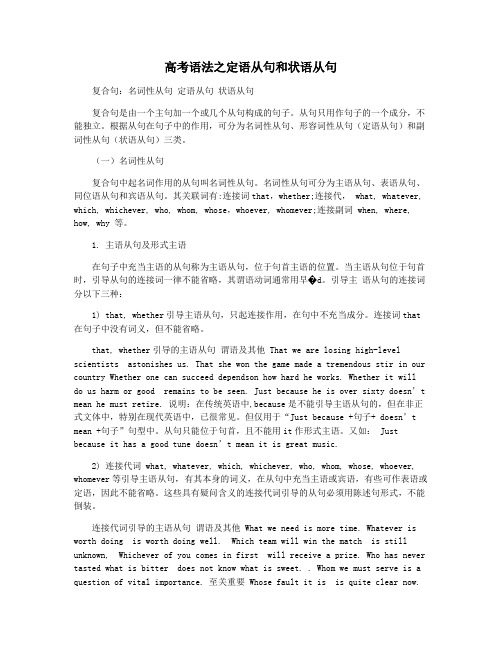
高考语法之定语从句和状语从句复合句:名词性从句定语从句状语从句复合句是由一个主句加一个或几个从句构成的句子。
从句只用作句子的一个成分,不能独立。
根据从句在句子中的作用,可分为名词性从句、形容词性从句(定语从句)和副词性从句(状语从句)三类。
(一)名词性从句复合句中起名词作用的从句叫名词性从句。
名词性从句可分为主语从句、表语从句、同位语从句和宾语从句。
其关联词有:连接词that,whether;连接代, what, whatever, which, whichever, who, whom, whose,whoever, whomever;连接副词 when, where, how, why 等。
1. 主语从句及形式主语在句子中充当主语的从句称为主语从句,位于句首主语的位置。
当主语从句位于句首时,引导从句的连接词一律不能省略,其谓语动词通常用早�d。
引导主语从句的连接词分以下三种:1) that, whether引导主语从句,只起连接作用,在句中不充当成分。
连接词that 在句子中没有词义,但不能省略。
that, whether引导的主语从句谓语及其他 That we are losing high-level scientists astonishes us. That she won the game made a tremendous stir in our country Whether one can succeed dependson how hard he works. Whether it will do us harm or good remains to be seen. Just because he is over sixty doesn’t mean he must retire. 说明:在传统英语中,because是不能引导主语从句的,但在非正式文体中,特别在现代英语中,已很常见。
2019高考英语三大从句名词性从句定语从句和状语从句详解
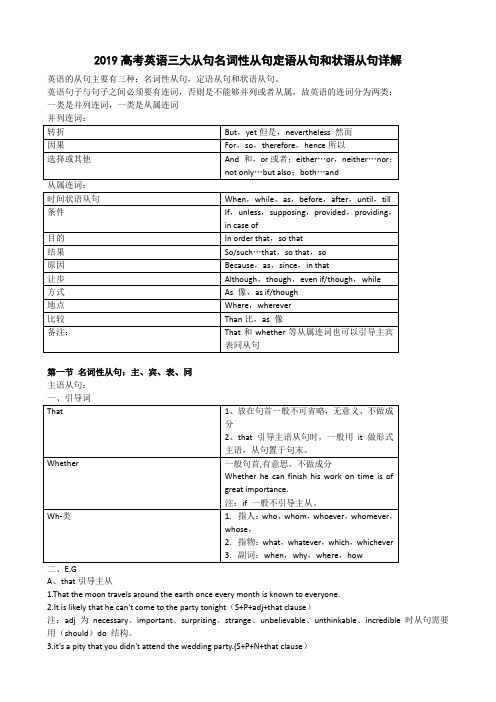
2019高考英语三大从句名词性从句定语从句和状语从句详解英语的从句主要有三种:名词性从句,定语从句和状语从句。
英语句子与句子之间必须要有连词,否则是不能够并列或者从属,故英语的连词分为两类:一类是并列连词,一类是从属连词并列连词:第一节名词性从句:主、宾、表、同主语从句:A、that引导主从1.That the moon travels around the earth once every month is known to everyone.2.It is likely that he can't come to the party tonight(S+P+adj+that clause)注:adj 为necessary、important、surprising、strange、unbelievable、unthinkable、incredible 时从句需要用(should)do 结构。
3.it’s a pity that you didn't attend the wedding party.(S+P+N+that clause)4.it is said that he possesses the too much money.(S+P+done that clause)5.it seems to me that you don't like the idea.(it+特殊动词that clause:seem,matter,turn out,happen等)B、指人指物的为连接代词:故在从句中充当:主宾表语成分,部分充当定语成分whose连接副词在从句中充当主要的时间地点原因和方式状语。
宾语从句一、引导词1.That 无意义,不做成分,口语可以省略,if/whether,有意思,不做成分注意,whether…or/or not;和介词后一般不用if 引导2.关系代词(指人,指物)which3.关系副词(时间地点原因方式)4.特殊的宾从:1.大多数及物动词可以带宾从;在一些v+adv结构中也可以如:figure out,work out,find out,point out 等;一些动词短语也可以如make sure that、keep in mind that2.注意:find,feel,think,consider,make,believe,guess,suppose,assume后如果有宾补时,要借助it形式宾语,将that从句后置Appreciate表示hate,like,take,owe,have,take()for granted等和see to留意后如果有宾补时需要借助it 形式宾语,将宾从后置e.g I hate if when that they talk with their mouth full of foodPlease see to it that the door is safely locked before you go注:介词后that 所引导的宾从必须要用it 形式宾语,除“beyond,but,besides,except,save that clause”“除了”和“in that”“因为”。
句子成分定语从句名词性从句状语从句详解
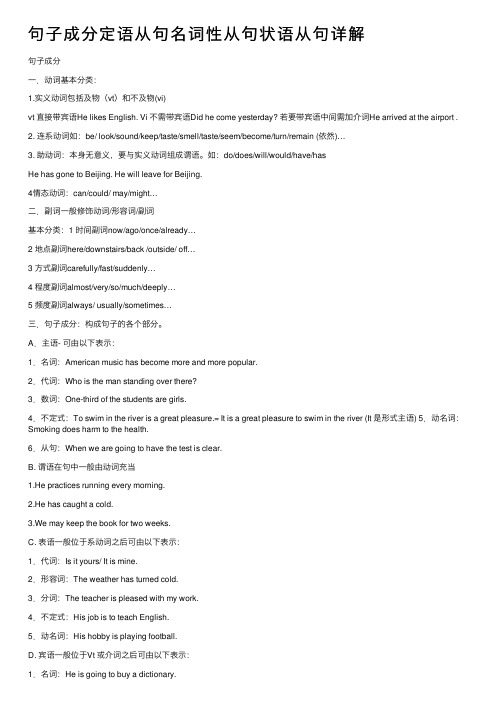
句⼦成分定语从句名词性从句状语从句详解句⼦成分⼀.动词基本分类:1.实义动词包括及物(vt)和不及物(vi)vt 直接带宾语He likes English. Vi 不需带宾语Did he come yesterday? 若要带宾语中间需加介词He arrived at the airport .2. 连系动词如:be/ look/sound/keep/taste/smell/taste/seem/become/turn/remain (依然)…3. 助动词:本⾝⽆意义,要与实义动词组成谓语。
如:do/does/will/would/have/hasHe has gone to Beijing. He will leave for Beijing.4情态动词:can/could/ may/might…⼆.副词⼀般修饰动词/形容词/副词基本分类:1 时间副词now/ago/once/already…2 地点副词here/downstairs/back /outside/ off…3 ⽅式副词carefully/fast/suddenly…4 程度副词almost/very/so/much/deeply…5 频度副词always/ usually/sometimes…三.句⼦成分:构成句⼦的各个部分。
A.主语- 可由以下表⽰:1.名词:American music has become more and more popular.2.代词:Who is the man standing over there?3.数词:One-third of the students are girls.4.不定式:To swim in the river is a great pleasure.= It is a great pleasure to swim in the river (It 是形式主语) 5.动名词:Smoking does harm to the health.6.从句:When we are going to have the test is clear.B. 谓语在句中⼀般由动词充当1.He practices running every morning.2.He has caught a cold.3.We may keep the book for two weeks.C. 表语⼀般位于系动词之后可由以下表⽰:1.代词:Is it yours/ It is mine.2.形容词:The weather has turned cold.3.分词:The teacher is pleased with my work.4.不定式:His job is to teach English.5.动名词:His hobby is playing football.D. 宾语⼀般位于Vt 或介词之后可由以下表⽰:1.名词:He is going to buy a dictionary.2.代词:We should learn from him.3.不定式:He decided not to see me.4.动名词:He practices running every morning.分类:分为直接宾语(动作的承受者,通常指物)和间接宾语(动作所向的⼈或物,通常指⼈)He sent me a present.=He sent a present to me. (me 间宾/ a present 直宾)He bought her a map= He bought a map for her.有些Vt 如:make/have/get/let/find/call/see/notice/hear/watch除了跟有⼀个宾语外,还要有⼀个宾语补⾜语来说明宾语的状态才能使句⼦完整。
名词性从句 定语从句 状语从句
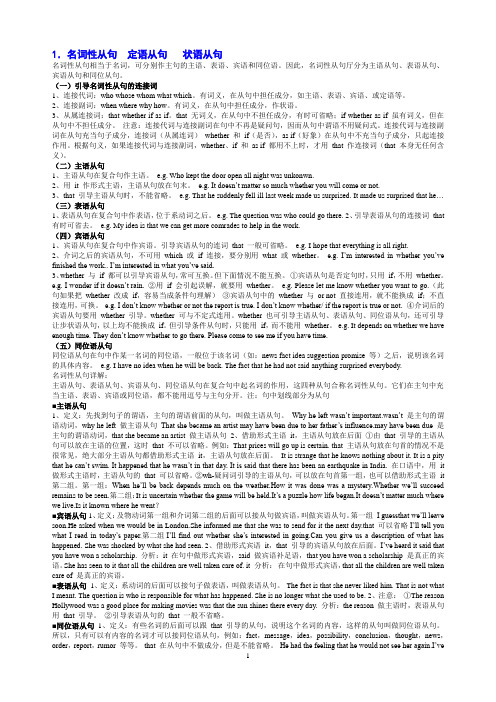
1.名词性从句定语从句状语从句名词性从句相当于名词,可分别作主句的主语、表语、宾语和同位语。
因此,名词性从句厅分为主语从句、表语从句、宾语从句和同位从句。
(一)引导名词性从句的连接词1、连接代词:who whose whom what which。
有词义,在从句中担任成分,如主语、表语、宾语、或定语等。
2、连接副词:when where why how。
有词义,在从句中担任成分,作状语。
3、从属连接词:that whether if as if。
that 无词义,在从句中不担任成分,有时可省略;if whether as if 虽有词义,但在从句中不担任成分。
注意:连接代词与连接副词在句中不再是疑问句,因而从句中谓语不用疑问式。
连接代词与连接副词在从句充当句子成分,连接词(从属连词)whether 和if(是否),as if(好象)在从句中不充当句子成分,只起连接作用。
根据句义,如果连接代词与连接副词,whether、if 和as if 都用不上时,才用that 作连接词(that 本身无任何含义)。
(二)主语从句1、主语从句在复合句作主语。
e.g. Who kept the door open all night was unkonwn.2、用it 作形式主语,主语从句放在句末。
e.g. It doesn‟t matter so much whether you will come or not.3、that 引导主语从句时,不能省略。
e.g. That he suddenly fell ill last week made us surprised. It made us surprised that he…(三)表语从句1、表语从句在复合句中作表语,位于系动词之后。
e.g. The question was who could go there.2、引导表语从句的连接词that 有时可省去。
三大从句(定语从句 状语从句 名词性从句)初中英语专项复习课件
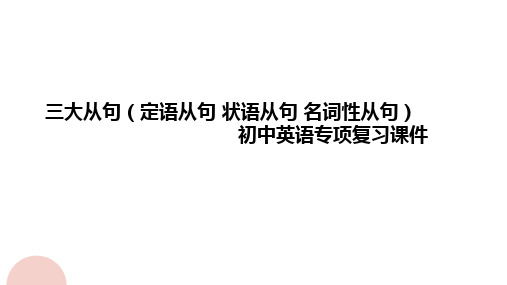
定语从句详解
The boys who are playing football are from Class One. I still remembered the day when I met you.
定语从句的补充
1.定语从句和同位语从句的区别
The idea that some groups of people may be more intelligent than others is one of those hypotheses that dare not speak its name.
一个漂亮的女孩。 a pretty girl I know a pretty girl. The girl likes singing.
句子成分概述
定语:用于修饰名词或代词。
一个漂亮的女孩。 a pretty girl I know a pretty girl. The girl likes singing. I know a pretty girl who likes singing.
定语从句的补充
定语从句的省略
As the roles men and women played in society became more rigidly defined, so did the roles they played in the home.
状语从句
问题:在一个简单句中,什么词能做状语?
名词性从句实战
例句1:
What is harder to establish is whether the productivity revolution that businessmen assume they are presiding over is for real.
定语从句、状语从句和同位语从句
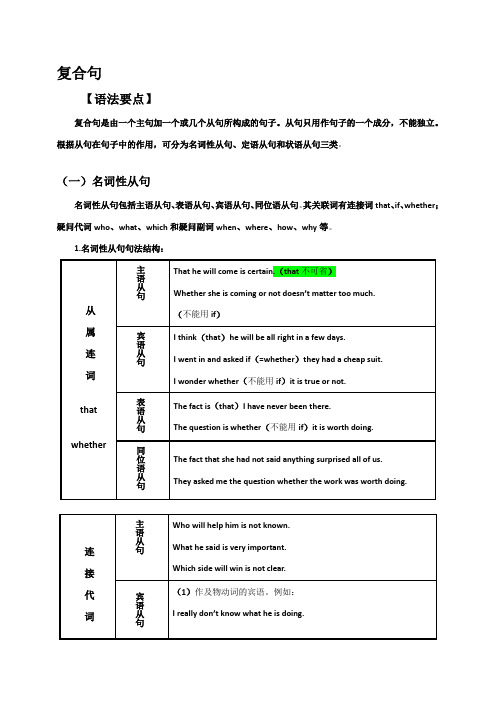
复合句【语法要点】复合句是由一个主句加一个或几个从句所构成的句子。
从句只用作句子的一个成分,不能独立。
根据从句在句子中的作用,可分为名词性从句、定语从句和状语从句三类。
(一)名词性从句名词性从句包括主语从句、表语从句、宾语从句、同位语从句。
其关联词有连接词that、if、whether;疑问代词who、what、which和疑问副词when、where、how、why等。
1.名词性从句句法结构:2.名词性从句的其它用法:1)if不能引导表语从句。
连接代词who、what、whose、which不能引导同位语从句。
2)有时as、as if/though、because也可以引导表语从句,能跟表语从句的谓语动词一般为系动词be、seem、look等。
例如:Things are not always as they seem to be.事情并不总是像表面上看来的那样。
It looks as if it were going to rain. It is because you eat too much.3)介词宾语不可以用which来引导,而要用what来引导。
例如:We can learn what we did not know. He will talk to us about what he saw in the .4)连词that引导的名词性从句除能用在except、but、in后之外很少作介词的宾语,。
其它一些介词的宾语从句如果由连词that引导,则需用it先行一步作形式宾语。
例如:He is a good student except that he is careless.You may depend on it that they will support you.5)若主句谓语动词是及物动词make、find、think、see、hear等,则把宾语从句置于宾语补足语之后,用it作形式宾语。
英语中五大从句
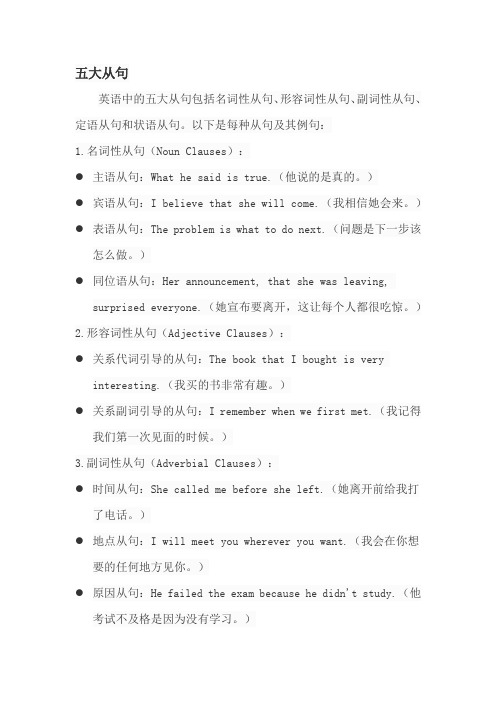
五大从句英语中的五大从句包括名词性从句、形容词性从句、副词性从句、定语从句和状语从句。
以下是每种从句及其例句:1.名词性从句(Noun Clauses):●主语从句:What he said is true.(他说的是真的。
)●宾语从句:I believe that she will come.(我相信她会来。
)●表语从句:The problem is what to do next.(问题是下一步该怎么做。
)●同位语从句:Her announcement, that she was leaving,surprised everyone.(她宣布要离开,这让每个人都很吃惊。
)2.形容词性从句(Adjective Clauses):●关系代词引导的从句:The book that I bought is veryinteresting.(我买的书非常有趣。
)●关系副词引导的从句:I remember when we first met.(我记得我们第一次见面的时候。
)3.副词性从句(Adverbial Clauses):●时间从句:She called me before she left.(她离开前给我打了电话。
)●地点从句:I will meet you wherever you want.(我会在你想要的任何地方见你。
)●原因从句:He failed the exam because he didn't study.(他考试不及格是因为没有学习。
)●条件从句:If it rains, we will stay indoors.(如果下雨,我们将呆在室内。
)●结果从句:He worked hard, so he succeeded.(他努力工作,所以成功了。
)4.定语从句(Adjective Clauses):●关系代词引导的从句:The man who is talking to my mother ismy uncle.(正在和我妈妈交谈的那个人是我叔叔。
四级定语从句、状语从句、名词性从句知识点整理

一、定语从句1.什么是定语从句?定语从句就是用一句话做定语,放在被修饰名词的后面。
This is a good book. 形容词作定语This is the book that got No.1 sale last week. 从句作定语This girl is my girlfriend. She is dancing with that guy.The girl / who is dancing with that guy is my girlfriend.she 指代的是the girl, 因此she 后面的内容就是修饰the girl, 两句话合并时,用who 代替the girl, 把从句嵌入原句中。
the girl 为先行词who 为关系词2.构成定语从句的两大要素(先行词,关系词)①先行词(定语从句所修饰名词)先行词可以是一个词,短语,一个分句,一个完整的句子He who laughs last laughs best.He likes climing mountains, which is a good exercise.He said that he had no time, which isn’t true.He arrived an hour later, which annoyed his girlfriend.②关系词(也可以称为引导词,引导从句)两大作用:连词作用和代词作用∴关系词分为:关系代词: who, that, which, whom, whose, (which, that 指物,who 作主语时指代人,whom 作宾部时指代人whose 指代所有格,…的)关系副词: when , where, whyPS: when = on/at whichwhere = in/on/at whichwhy = for whichI like people who are honest. 这里面who 指代的people, 作关系代词I like the library where I can read.where= in which, 引导的定语从句修饰library, 把library 带回定语从句中,Ican read in the library. 做状语,因此where 是关系副词。
英语六大从句

从句有主语从句、表语从句、宾语从句、同位语从句、定语从句和状语从句6类.前四类由于主语从句、表语从句、宾语从句及同位语从句在句子的功用相当于名词,所以通称名词性从句;后两类定语从句和状语从句功用相当于形容词,称为形容词性从句.状语从句还可以分为条件状语从句、原因状语从句、方位状语从句和时间状语从句.1.主语从句(Subject Clause):用作主语的从句叫主语从句.引导主语从句的关联词有从属连词、疑问代词、疑问副词、缩合连接代词、缩合连接副词等.2.表语从句 Predicative Clause):用作表语的从句叫表语从句.引导表语从句的关联词与引导主语从句的关联词大都一样.3.宾语从句(Object Clause):在句子中起宾语作用的从句叫做宾语从句.宾语从句分为三类:动词的宾语从句,介词的宾语从句和形容词的宾语从句.第一部分一.、定义:宾语从句就是一个句子作动词或介词的宾语.二、学习宾语从句要抓住三要素:连接词、语序和时态.连接词一般都是that(指事务或人),which 指事),who 指人)1.从句为陈述句,常选择连接词that或将that省略,直接与主句相连.2.从句为一般疑问句,常选择连接词if或whether.在whether…or not结构中不能用if替换. 3.从句为特殊疑问句,常选择what,when,where,which,who,how等的疑问代、副词作连接词.★当who为主语时,句式为:who+谓语+其他判断时态情况:1.主句是一般现在时,从句为各种时态情况2.主句是一般过去时,从句为各种相应过去时态注意:从句描绘客观事实,用一般现在时3.主句是一般将来时,一般从句为一般现在时 “主将从现”)例题:〈1. The teacher told the children that the sun__B__round.A. wasB. isC. wereD. are 答案为B,属于第二种情况.宾语从句,在复合句中作宾语,位于及物动词后;Tell him which class you are in .(1)主、从句时态一致:主句谓语过去时,从句相应过去时;He answered that he was listening to me.主句谓语现在时,从句时态任所需;He says (that) he will leave a message on my desk.具体过去永不变,真理格言现在时;He told me that he was born in 1980.2)否定前移,及完成反意问句;在think / believe / suppose / guess / imagine / expect等动词后跟宾语从句否定式时,应转移到主句上去,完成反意疑问句时,应与从句主、谓保持一致.(注: 否定前移的条件是,主句主语是第一人称)I don't think you are right ,are you ?3)在表示建议suggest , advise要求demand 、desire、require、request、propose;决定decide; 命令order、command; 坚决主张insist;等动词后跟宾语从句,用 should)+v. 虚拟语气)eg.I suggested that you should)study hard.4)如果宾语从句后有宾语补足语,用it作形式宾语,把宾语从句后置eg.You may think it strange that he would live there.5)宾语从句that常可省略,但在以下情况下不能省略A.当主句谓语动词带有两个或两个以上宾语从句时,可以省略第一个that,其他不能省略. eg.I believe that)you have done your best and that things will get bet?鄄ter.B.当it作形式宾语时eg.She made it clear that she had nothing to do with him.C.当宾语从句前置时eg.That our team will win,I believe.三、分类A 、作动词的宾语:eg.I heard the newsI 主语heard 谓语动词the news.名词作宾语I主语heard 谓语动词that he would come here later on.一个句子作宾语---宾语从句B 、作介词的宾语:eg.He said nothing about this plan .He主语said 谓语动词nothing 代词作动词的宾语about 介词the plan. 名词作介词的宾语四、带有宾语从句的复合句的构成:带有宾语从句的复合句就是用连接词把一个主句和一个宾语从句连接在一起.连接词有:that(可省略),what, who, when, where, why, which, if, whether, how.五、注意:A 宾语从句必须用陈述语序.False: He is wondering when can he finish this difficult job.Right: He is wondering when he can finish this difficult job.B 有时候可以用it 作形式宾语,而把真正的宾语从句放在后面.Bad: I thought that he could finish this job in just two hours impossible.Good: I thought it impossible that he could finish this job in just two hours.Bad: He left whether we should continue this project to my judgment.Good: He left it to my judgment whether we should continue this project.C 带有宾语从句的复合句的否定形式一般是否定主句.Bad: I think he doesn’t like the English teacher.Good: I don’t think he likes the English teacher.D False: He wanted to know why he is crying in the corner.Right: He wanted to know why he was crying in the corner.4.同位语从句(Appositive Clause):与先行词同位或等同的从句叫作同位语从句.其关联词多为that.5.定语从句 Attributive Clause):用作定语的从句叫定语从句.定语从句一般皆放在被它所修饰的名 代)词之后,这种名 代)词就叫作先行词 Antecedent).引导定语从句的关联词为关系代词(或称引导词、关系词等).关系代词在定语从句中可用作主语、宾语、定语等;关系副词在定语从句中用作状语.①引导定语从句的关联词有who, whom, whose, that, when, where, why 和which. 在非限制定语从句中, 只可用which, who, whose, where , when., 如果指代前面整个句子, 多用which.例句:The dog that/which was lost has been found. 失踪的狗已经找到了.)③as 可做引导词引导定语从句, 多和such, the same 连用. As 引导的定语从句也可修饰整个句子, 既可放在先行词后,也可放在句子开头.例句:Such people as you describe are rare nowadays. 你描述的那一类人现在很少了.)④介词+which/whom/whose从句The driver is the man from whose room she had stolen the gold watch. 她就是从那个司机的房间偷了金表的.)⑤代/名+介词+which 从句He is needing a book, the name of which I don't know.( 他需要一本书,但是我不知道书名.)⑥同位语从句和定语从句The news that you told me was really exciting. 你告诉我的好个消息真的是很激动人心.)⑦难句:NO.1He is one of the men who were chosen to represent the group. 他是被选为代表该团队的人中一员.)第二部分一、时态1·主句用一般现在时,从句可用任意时态.2·主句用过去时,从句用过去某个时态.3·主句用过去时,从句是真理时,只用一般现在时.二、宾语从句的几类连接词:①从属连词连接宾语从句的从属连词主要有that,if,whether. that引导表示陈述句的宾语从句,而if和whether引导表示“是否”的宾语从句.例句:I don’t know if there will be a bus any more.我不知道是否还会有公交车.②连接代词连接代词主要有who, whom ,whose ,what ,whoever ,whomever ,whosever, whatever, whichever等.连接代词一般指疑问,但what, whatever除了指疑问外,也可以指陈述.例句:Do you know who has won Red Alert game?你知道谁赢了这一局红警游戏吗?③连接副词连接副词主要有when,where,why,how,whenever,wherever,however等.例句:He didn’t tell me when we should meet again.他没有告诉我什么时候我们能再见面.三、动词的宾语从句大多数动词都可以带宾语从句We all expect that they will win , for members of their team are stronger.我们都预料他们会赢,因为他们的队员更强壮.★部分“动词+副词”结构也可以带宾语从句例句:I have found out that all the tickets for the concert have been sold out.我发现这场音乐会的所有票都卖光了.★动词短语也可以带宾语从句常见的这些词有:make sure确保make up one’s mind下决心keep in mind牢记例句:Make sure that there are no mistakes in your papers before you turn them in.在上交试卷前确保没有任何错误.四、可运用形式宾语it代替的宾语从句①动词find,feel,consider,make,believe等后面有宾语补足语的时候,则需要用it做形式宾语而将that宾语从句后置.例句:I think it necessary that we take plenty of hot water every day .我认为每天多喝开水是有必要的.②有些动词带宾语从句时寻要在宾语与从句前加it这类动词主要有:hate, take , owe, have, see to.例句:I hate it when they with their mouths full of food.我讨厌他们满嘴食物时说话.③若宾语从句是wh-类,则不可用it代替例句:We all consider what you said to be unbelievable.我们都认为你所说的是不可信的.五、介词的宾语从句用wh-类的介词宾语从句例句:We are talking about whether we admit students into our club.我们正在讨论是否让学生加入我们的俱乐部.★用that,if引导的介词宾语从句有时候except,but,besides三个介词后可见到that引导的宾语从句例句:I know nothing about my new neighbor except that he used to work with a company.对于我的新邻居我只知道他曾在一家公司上班,其他一无所知.六、形容词的宾语从句常用来引导宾语从句的形容词有:sure,certain,glad,please,happy,sorry,afraid,satisfied,surprised例句:I am sure I will pass the exam.我确信我会通过考试.七、if,whether在宾语从句中的区别①if和whether在作“是否”解时,引导宾语从句常放在动词know,ask,care,wonder,find out等之后,介词后一般不用if②少数动词,如:leave,put,discuss,doubt后的宾语从句常用whether.③whether后可以加or not,但是if不可以.④在不定式前只能用whether.如:I can’t decide whether to stay. 我不能决定是否留下.⑤避免歧异时,我们常用whether而不用if.八、哪些宾语从句不可以省略引导词that1.当that作learn,suggest,explain,agree,wonder,prove,mean,state,feel,hold等动词的宾语时;2.当宾语从句较长时;3.当主语状语置于主句尾,宾语从句之前时;4.当主语谓语动词(包括非谓语动词)与宾语从句之间有插入语时;5.当一个动词带有两个或两个以上宾语从句时,此时第一个that可以省略,第二个that不可以省略;6.当宾语从句中的主语是this,that或this,that做主语的定语时;7.当宾语从句是双宾语中的直接宾语时;8.当宾语从句的主语是非谓语动词或主语从句时;9.当主语中的谓语动词是固定词组时;10.当宾语从句有it做其先行词时;11.在直接引语中,转述分句把宾语从句隔开时.九、宾语从句的否定转移主句的谓语动词是think,believe,imagine,suppose,consider,espect,fancy,guess等,并且主句的主语是第一人称而且为一般现在时,从句的否定词一般要转移到主句上来,其反义疑问句一般与宾语从句一致.例句:I don’t think he will come to my party.而不能说成I think he won’t come to my party.我认为他不会来我的舞会.★如果宾语从句中有某个含有否定意义的形容词或副词,其反义疑问句要用肯定形式.例句:We find that he never listens to the teacher carefully,does he?我们发现他从来不仔细听老师讲课,是不是?十、宾语从句的时态和语序当主句为现在时或将来时的时候,宾语从句的时态一般不受主句的时态所影响.当主句为过去时的时,细分为一下几种情况:①从句用一般过去时或过去进行时表示与主句谓语动词动作同时发生例句:I only knew he was studying in a western country,but I didn’t know what country he was in.我只知道他当时在西方的一个国家读书,可不知道是哪个国家.②从句过去完成时表示该动作发生在主句谓语动作之前例句:He told me that he had told Mary about the meeting already.他告诉我他已经把有关会议的事情告诉的了Mary.③从句谓语用过去将来时表示该动作发生在主句谓语动作之后例句:The reporter asked if the government would take necessary measures to put down the to-do.记者问政府是否会采取必要的措施镇压骚乱.★如果从句是一个客观真理,那么从句的时候不根据主句的时态而变化例句:The teacher said that the moon goes around the earth yesterday.老师昨天说月亮绕着地球转.★当宾语从句的引导词是who,which,what,when,where,how,why等表疑问时,不能按正常语序安排,经常将这类引导词置于句首例句:Who do you think the public might choose as their favorite singer this year?你认为今年公众会选谁为他们最喜欢的歌手.同位语从句用法比较"固定",把关键的几个词背下来 下面这个材料供参考):一、在复合句中用作同位语的从句叫同位语从句.它一般跟在某些名词后面,用以说明该名词表示的具体内容.如:I had no idea that you were here.我不知道你在这里.二、可以跟同位语从句的名词通常有news,idea,fact,promise,question,doubt,thought,hope,message,suggestion,words消息),possibility等.如:I’ve come from Mr wang with a message that he won’t be able to see you this afternoon.我从王先生那里来,他让我告诉你他今天下午不能来看你了.三、英语中引导同位语从句的词通有连词that,whether,连接副词how,when,where等.( 注:if,which 不能引导同位语从句.)如:l have no idea When he will be back.我不知道他什么时候回来.四、有时同位语从句可以不紧跟在说明的名词后面,而被别的词隔开. 如:The thought came to him that maybe the enemy had fled the city.他突然想起可能敌人已经逃出城了.五、同位语从句与定语从句的区别.1、同位语从句与前面的名词是同位关系,即说明它前面名词的内容;而定语从句与前面的名词是修饰与被修饰关系,即限定它前面的名词范围,或补充一些情况.如:The news that l have passed the exam is true.我通过了考试这一消息是真的.同位语从句,即从句所表达的意思就是前面名词的内容.)The news that he told me just now is true.他刚才告诉我的消息是真的.定语从句,从句对前面名词起修饰限制作用,即“他告诉我的”那个消息,而不是别的消息.)2、引导同位语从句的that是连词,在从句中不充当任何成份,而引导定语从句的that是关系代词,除起连接作用外,还在从句中充当主语、宾语或表语等.如:The idea that computers can recognize human voices surprises many people.计算机能够识别人的声音的想法使许多人感到惊奇.that在从句中不充当任何成份.)一个名词(或其它形式)对另一个名词或代词进行修饰,限定或说明,这个名词(或其它形式)就是同位语.同位语与被它限定的词的格要一致,并常常紧挨在一起.1) 非独立的同位语:常出现在被限定词前Bruce Lee (姓名) 李小龙Graf Schmidt (称号,浑名) 施密特伯爵Doktor Wang (职称,头衔) 王博士Uncel Liu (亲戚的称呼) 刘叔叔die Stadt Shanghai (类属名称) 上海市the Province Hebei (类属名称) 河北省das Jahr 2000 (类属名称) 2000 年three Kilo tomato (度量名称) 三公斤西红柿the University Bremen (专有名词) 不来梅大学。
2019高考英语语法专题汇总:定语从句 、状语从句、名词性从句
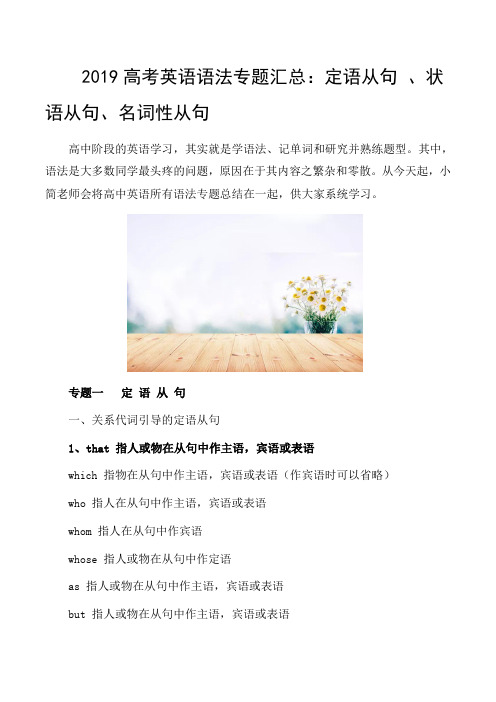
2019高考英语语法专题汇总:定语从句、状语从句、名词性从句高中阶段的英语学习,其实就是学语法、记单词和研究并熟练题型。
其中,语法是大多数同学最头疼的问题,原因在于其内容之繁杂和零散。
从今天起,小简老师会将高中英语所有语法专题总结在一起,供大家系统学习。
专题一定语从句一、关系代词引导的定语从句1、that 指人或物在从句中作主语,宾语或表语which 指物在从句中作主语,宾语或表语(作宾语时可以省略)who 指人在从句中作主语,宾语或表语whom 指人在从句中作宾语whose 指人或物在从句中作定语as 指人或物在从句中作主语,宾语或表语but 指人或物在从句中作主语,宾语或表语注意:指物时,whose+名词=the+名词+of which或 of which+the+名词2、as 的用法(1)常用于下列结构:such…as; so…as;the same…as; as…as注意:the same…as 表示同一类,不同一个the same…that 表示同一个(2)as与which的区别a、位置不同as可放在主句后,主句前或主句中间;which只能放在主句后。
b、as起连接作用,表达说话人的观点、看法,并指出主句内容的根据或出处,意为“正如,正像”。
Which相当于并列句,可以用and this来代替,意为“这一点,这件事’”。
注意:as常用于下列结构:as we know/ as is known to all, as we all can see, as has been said before/above,as might be excepted, as is often the case, 一般不能用which代替as。
c、在从句中作主语时,which既可作系动词be的主语也可作实义动词的主语,而as只可作系动词be的主语。
二、只用that不用which的情况1、.先行词为 all , much, everything, nothing , something ,anything, nothing, none, the one等不定代词时2、先行词被only, any, few, little, no , all, just , very ,right等修饰时.3、当先行词是最高级或被形容词最高级修饰时。
英语八大从句类型与用法总结

英语八大从句类型与用法总结从句是句子中的一种结构,可以用来增强句子的表达能力。
英语中常见的八大从句类型包括:1. 名词性从句 (Noun Clauses)名词性从句用来作为名词的替代,可以作为主语、宾语、表语或同位语等。
常见的名词性从句有:主语从句(作主语),宾语从句(作宾语),表语从句(作表语),同位语从句(作同位语)。
2. 定语从句 (Adjective Clauses)定语从句用来对一些名词或代词进行修饰和限定,一般紧跟在被修饰的名词或代词之后。
常见的引导词有:that, which, who, whom, whose 等。
3. 状语从句 (Adverbial Clauses)状语从句用来修饰动词、形容词、副词等,表示时间、地点、原因、条件、结果等。
常见的引导词有:when, while, before, after, since, because, if, unless, so that等。
4. 并列从句 (Coordination Clauses)并列从句是由连词and, but, or等连接在一起的两个或多个独立的主句。
并列从句可以使用逗号或分号分隔。
5. 让步从句 (Concessive Clauses)让步从句用来表示与主句相对抗的情况,常用的引导词有:although, though, even though, while等。
6. 条件从句 (Conditional Clauses)条件从句用来表示其中一种条件,通过条件从句的实现与结果从句的实现之间的关系。
常见的引导词有:if, unless, as long as, provided that等。
7. 结果从句 (Result Clauses)结果从句用来表示主句发生的结果,常见的引导词有:so that, such that, so...that等。
8. 目的从句 (Purpose Clauses)目的从句用来表示主句的目的或意图,常见的引导词有:so that, in order that等。
1定语从句,名词性从句,状语从句

• Having checked the doors were closed, and _______ all the lights were off, the boy opened the door to his bedroom. (2007 湖南卷) A. why B. that C. when D. where
• Nobody believed his reason for being absent from the class ______ he had to meet his uncle at the airport. A. why B. that C. where D. because
• Nobody believed the reason _______he explained for being absent from the class. A. why B. that C. as D. because
• ____ matters most in learning English is enough practice.(2007 全国卷II) A. What B. Why C. Where D. Which
• His movie won several awards at the film festival, ______ was beyond his wildest dream.(2007 上海) A. which B. that C. where D. it
•
The farmhouse we paid a visit ____ at the top of the hill. A. standing B. to stand C. to standing D. to stands
三大从句区别(定从,名词从,状从)
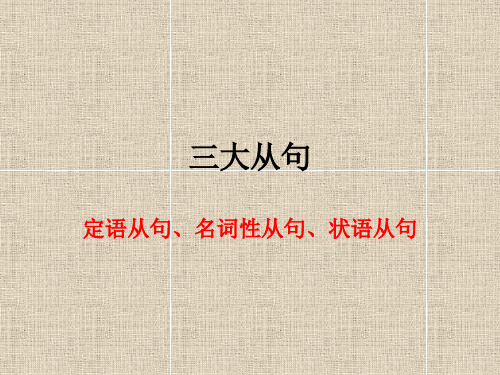
7. The question is who is responsible for what has happened. _________________. 表语从句/宾语从句 8. I don’t think that they will win the game. ___________________. 宾语从句 9. Whatever you do, you must do it well. _____________________. 让步状语从句 10. Whatever I have now will be yours in the future. _________________. 主语从句 11. The book can be of help to whoever wants to do 宾语从句 the job. ________________. 12. It remains doubtful whether this is an important discovery. ________________. 主语从句
三大从句
定语从句、名词性从句、状语从句
• 从句是相对于主句而言的,即它是从属于 某一个主句,而不能单独作一个句子。在 英语中,主要有三大从句,即名词性从句 (包括主语从句,宾语从句,表语从句, 同位语从句)、定语从句、状语从句
• (包括时间、条件、结果、目的、原因、 让步、地点、方式等)。
以he walked home all the way. 时间状语从句 _____________. 4. Many people, as you know, are learning foreign 定语从句 languages. _________________. 5. The news that our team has won the game was 同位语从句 true. _________________. 6. It was obvious that you’ve made a big mistake. 主语从句 ________. 7. He will talk to us about what he saw in the school. 宾语从句 _________________. 8. He looks as if he was going to cry. 表语从句 _________________.
- 1、下载文档前请自行甄别文档内容的完整性,平台不提供额外的编辑、内容补充、找答案等附加服务。
- 2、"仅部分预览"的文档,不可在线预览部分如存在完整性等问题,可反馈申请退款(可完整预览的文档不适用该条件!)。
- 3、如文档侵犯您的权益,请联系客服反馈,我们会尽快为您处理(人工客服工作时间:9:00-18:30)。
定语从句、名词性从句和状语从句从A、B、C、D四个选项中,选出可以填入空白处的最佳选项。
1. _____ is known to the world, China’s Liu Xiang became the first Asian in history to win the men’s 110m hurdles at the Olympic Games.A. ThatB. WhichC. AsD. It2. Living in the Central American desert has its problems, _____ obtaining water is not the least.A. of whichB. for whatC. asD. whose3. I don’t know the reason _____ you were absent from the meeting, but I am sure that someone will tell me the reason _____ you haven’t told me.A. why; thatB. that; whyC. because; whichD. of which; that4. When she came back from abroad, Lucy told us about the cities and the people _____ she had visited.A. thatB. whoC. whereD. which5. Because of the traffic jam _____ I was caught, I was late for the meeting.A. by whichB. in whichC. thatD. where6. The humans are destroying nature day by day, _____ of course, will cause severe punishment from it sooner or later.A. whoB. whenC. whereD. which7. He knew the files could be of help to _____ took over the job.A. whoeverB. whomeverC. whateverD. whosever8. _____ China got the second place in the 2004 Olympic Games made the whole nation very excited.A. WheneverB. WhetherC. IfD. That9. An idea occurred to me _____ I might turn to my English teacher for help.A. whichB. thatC. whereD. when10. _____ was of little importance.A. Whether he passed the examination or notB. No matter he might pass the examinationC. He might pass the examinationD. What he passed the examination11. There are three things _____ make Sydney famous: its beautiful harbor, the Sydney Harbor Bridge and the Sydney Opera House.A. whatB. thatC. whenD. where12. The painter lived more than a decade in Europe, _____ he could be in close touch with other artists.A. whereB. howC. whenD. which13. The soldiers had to sleep in their wet clothes, _____ most uncomfortable.A. which I think it wasB. which I think wasC. which I thinkD. that I think was14. The thick smog covered the whole city. It was _____ a great black blanket had been thrown over it.A. thatB. becauseC. as ifD. even if15. Word came from Mr. Smith _____ he could arrive on the following Saturday.A. about whichB. thatC. whetherD. of which16. _____ we have finished the course, we shall start doing more revision work.A. For nowB. Since thatC. Now thatD. By now17. I have been keeping the portrait _____ I can see it every day, as it always reminds me of my childhood in Paris.A. sinceB. whereC. asD. if18. _____ he was, he sat up late studying last night.A. As tiredB. Though tiredC. Tired asD. Tired although19. --- Would you like a cigarette?--- No. It’s several years _____ I gave up smoking.A. afterB. sinceC. whenD. before20. It wa s the belief _____ Alex Haley could find his “root” in Africa _____ made him decide to go to Gambia.A. that; whereB. where; thatC. that; thatD. how; which21. I believe _____ you’ve done your best and _____ things will improve very soon.A. whether; thatB. 不填; thatC. that; whichD. if; that22. _____ was known to them that Bob had broken his promise _____ he would give them a rise.A. What; whatB. It; whichC. As; thatD. It; that23. My favorite room is the tidy study with a fireplace, _____ we can watch TV and enjoy the nice scenery outside.A. whereB. whenC. thatD. which24. It is an interesting story and one can’t put it down _____ one has finished reading it.A. afterB. whenC. unlessD. until25. --- Will you go to Mary’s birthday party?--- No. _____ invited, I can’t go. I’ll be too busy then.A. IfB. UnlessC. Even ifD. When26. Actually, girls can be _____ they want to be just like boys, whether it is a pilot, an astronaut, or a general manager.A. whereverB. howeverC. whateverD. whoever27. No sooner had they settled themselves in their seats in the theatre _____ the curtain went up.A. thanB. whenC. beforeD. as soon as28. We’ll start off as we planned _____.A. no matter he will come or notB. no matter whether he will come or notC. whether is he coming or notD. whether he comes or not29. To my delight, there was my purse in the back seat of the taxi, _____ the driver couldn’t possibly have seen it before.A. thatB. whichC. whereD. when30. They wouldn’t let their cat outside _____ it would get run over.A. otherwiseB. supposingC. for fear thatD. so that31. I’ll go to the party with you _____ you don’t wear those strange trousers.A. on condition thatB. as soon asC. as thoughD. in this case32. They were short of experience. That was _______ they had to learn from practiced workers..A. whyB. thatC. becauseD. for33. The great use of a school education is not so much to teach you things _____ to teach you the art of learning.A. thanB. rather thanC. norD. as34. You may use my room as you like, _____ you clean it up afterwards.A. so far asB. as well asC. as soon asD. so long as35. I shall take you back to France _____ you are well enough to travel.A. presentlyB. quicklyC. directlyD. at once36. Let’s talk all this over again _____ we make a final decision.A. afterB. whileC. beforeD. when37. Mr. Smith wanted to buy the house and he told me that _____ the house cost, it would be _____ it.A. however; worthB. how much; worthC. whatever; worthD. what; worthy38. --- Why didn’t you try your best to get on the bus?--- I tried to, but _____ I could it started moving.A. untilB. whenC. beforeD. after39. Perhaps _____ most separates the successful people from others is _____ they live on purpose.A. what; thatB. that; whatC. that; thatD. what; what40. I had not been reading for half an hour _____ I heard steps outside.A. whenB. thatC. whileD. as41. The parents were worried about their daughter because nobody was aware of _____ she had gone.A. to whichB. the place whichC. the placeD. where42. --- They don’t have much in their house yet.---_____ they’re planning to live here only until Bob gets his degree, they don’t want to buy much furniture.A. WhileB. AlthoughC. SinceD. As far as43. It w as an unforgettable moment for all the citizens this year, _____ in 20 years China’s women’s volleyball team won the Olympic gold medal again.A. thatB. whichC. whenD. while44. --- Do you know _____ Mr. Black’s address is?--- He may live at No. 18 or No. 19 of Bridge Street.A. whichB. whereC. whatD. that45. When you answer questions in a job interview, please remember the golden rule: Always give the monkey exactly _____ he wants.A. whatB. whichC. whenD. that46. I’ll see you after the show and give you $20 for the tickets, or _____ much they cost.A. whateverB. whetherC. no matterD. however47. We should be able to do the job for you quickly, _____ you give us all the necessary information.A. in case ofB. provided thatC. or elseD. as if48. I felt somewhat disappointed and was about to leave, _____ something occurred, which attracted my attention.A. unlessB. untilC. whenD. while49. Determination is a kind of quality --- and that is _____ it takes to do anything well.A. thatB. whichC. whyD. what50. The treatment will continue until the patient reaches the point _____ he can walk correctly and safely.A. whenB. whereC. whichD. how51. Many policemen on duty will not be able to spare one minute to watch the football match, _____ they might only be meters away from the action.A. becauseB. althoughC. ifD. where52. After five hours’ drive, they reached _____ they thought was the place they’d been dreaming of.A. thatB. whereC. whichD. what53. _____ you keep on trying, I don’t really mind whether you can come out top in your class.A. So long asB. As soon asC. OnceD. The moment54. There is no doubt _____ China is always trying to keep world peace and against any war.A. thatB. whetherC. ifD. when55. There is a teapot shaped like a Chinese duck, out of _____ mouth tea is supposed to come.A. whichB. thatC. itsD. whose56. Fortunately, we found that we hadn’t waited long _______ the police came to help us.A. afterB. untilC. beforeD. when57. You should make it a rule to leave things____you can find them againA. whenB. whereC. thenD. there58. We'll have to finish the job.____.A. long it takes howeverB. it takes however longC. long however it takesD. however long it takes59.______she couldn’t understand was _______ fewer and fewer students showed interest in her lesson.A. What , whyB. That , whatC. What , becauseD. Why , that60.Someone is ringing the doorbell. Go and see ___________.A. who is heB. who he isC. who is itD. who it isCAAAB DADBA BABCB CBCBC BDADC CADCC AADDC CCCAA DCCCA DBCDB BDAAD CBDAD。
